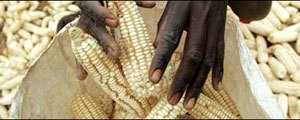
ZIMBABWE expects to harvest at least 1,2 million metric tonnes of maize this year, one and half more than the country produced last year, the Zimbabwe Commercial Farmers’ Union (ZCFU) said last week.
NQOBILE NKIWANE
The country harvested about 800 000 metric tonnes of maize last year against a national requirement of 2,1 million metric tonnes. ZCFU president, Wonder Cha-bikwa said even the traditionally dry areas of the country will this year contribute significantly to the national harvest.
“Provinces like Masvingo and Matabeleland South received normal to above normal rainfall and will therefore have a much better harvest,” he said.
Chabikwa said both food and commercial crops were generally doing well, adding that tobacco was already being auctioned.
“Cotton is also doing well mostly in drier areas like Chiredzi, Save Valley and Gokwe,” he said.
The 2013-14 cropping season has been characterised by normal to above normal rains raising hopes of improved harvests.
CFU president said the union hoped that the rains would continue up to the end of February and into the first week of March “so that the soya bean crop will reach its maximum maturity stage”.
- Chamisa under fire over US$120K donation
- Mavhunga puts DeMbare into Chibuku quarterfinals
- Pension funds bet on Cabora Bassa oilfields
- Councils defy govt fire tender directive
Keep Reading
“Some farmers planted late because of lack of inputs and funding and therefore still need the rain,” he said.
Chabikwa however said some maize crop was not so pleasing because the farmers failed to get funding for top dressing fertiliser.
A bag of top dressing fertiliser goes for between US$35 to US$40.
Chabikwa however said, despite the financial challenges and negative impact of the rains in sandy areas, he foresaw a much better scenario at the end of this season compared to last year.
“The heavy rains experienced throughout the season washed the nutrients down below the root level in areas with sandy and light soils and this affected the crops,” he said.
Zimbabwe has been unable to feed its people since the 2000 land reform programme which displaced hundreds of commercial farmers.
Once the breadbasket of the southern African region, the country now relies on food imports from neighbouring countries such as South Africa and Zambia.
The national food deficit expected this year could mean that the southern African nation of 14 million people will continue to import food to feed its hungry population.










